21-year-old Tom McKibbin is a very exciting prospect but a missing link between elite amateur and professional level leaves him as Ireland’s only full DP World Tour card holder this season under the age of 35.
As the Irish amateurs gear up for another exciting year after a trophy-laden 2023, our aspiring professionals who have fled the environment of national panels are finding out the hard way that life on tour can be a test of more than just your ability as a golfer.
Golf Ireland provides high quality pathways at amateur level that have seen Irish players take the world stage by storm. You need only look at the courses our elite amateurs play on the Irish championship schedule – there isn’t a calendar like it as players from the UK look across the Irish sea in envy.
With just over €4m spent on the ‘High Performance’ section of the Golf Ireland Strategy over the last decade, we have continued to produce some of the best amateurs in the world and we enter the 2024 season with four men and three women ranked inside the top-120 of their respective World Amateur Golf Rankings.
The Amateur Championship and Women’s Amateur Championship will dock in Ballyliffin and Portmarnock respectively this summer, while Lahinch will host the 2024 Palmer Cup in a dress rehearsal for the pinnacle of amateur golf, the Walker Cup, in 2026.
Last year, four Irish players played on the Great Britain and Ireland Walker Cup team (Alex Maguire, Matthew McClean, Mark Power, Liam Nolan), the most since the Famous Five of 2015, while Lauren Walsh and Annabel Wilson have donned the GB&I colours in the Curtis Cup in the last four years.
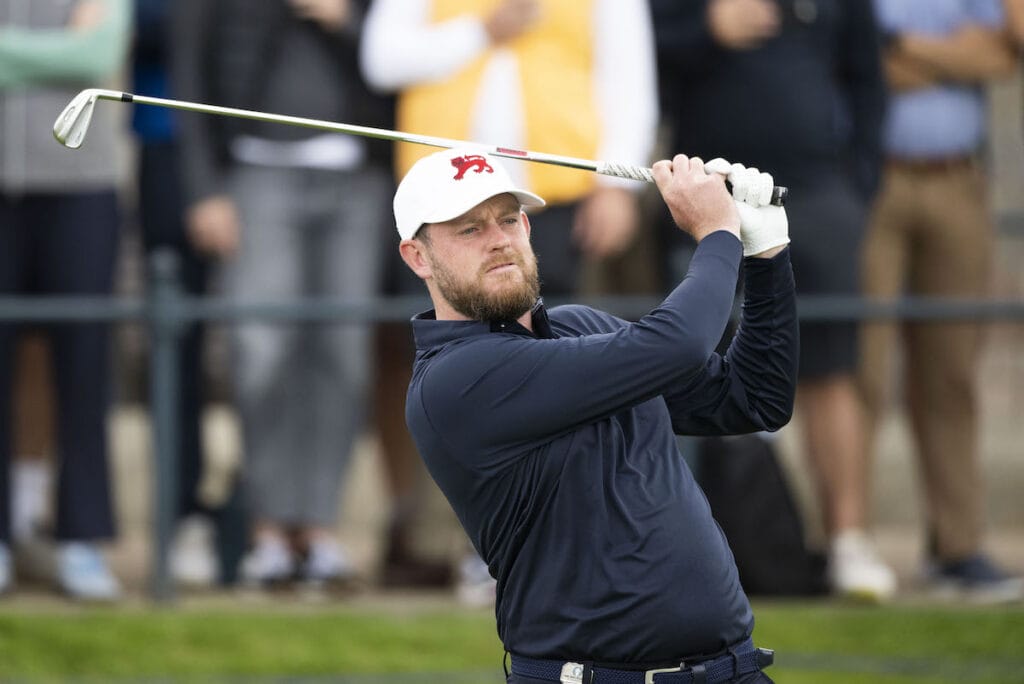
Maguire (The Open) and McClean (The Masters, US Open) made major championship debuts as amateurs, while Maguire (St Andrews Links Trophy) and Nolan (South American Amateur, Brabazon Trophy) won prestigious amateur titles abroad.
Then there was Roganstown starlet Sean Keeling who was one of the shining lights for Europe in Rome as they won the Junior Ryder Cup.
Ireland’s female amateurs enjoyed similar success in 2023. Aine Donegan made the cut at the US Women’s Open having come through a qualifier for Pebble Beach while her close friend Anna Foster also qualified for the AIG Women’s Open later that summer.
Sara Byrne had an electric 2023, winning the Irish Close Championship before capping off her year with back-to-back US collegiate wins for Miami, including breaking the 54-hole scoring record, and has been named the University’s ‘Golfer of the Month’ twice already this season, and Ireland also had three Palmer Cup representatives in Max Kennedy, Ryan Griffin, and Lauren Walsh.
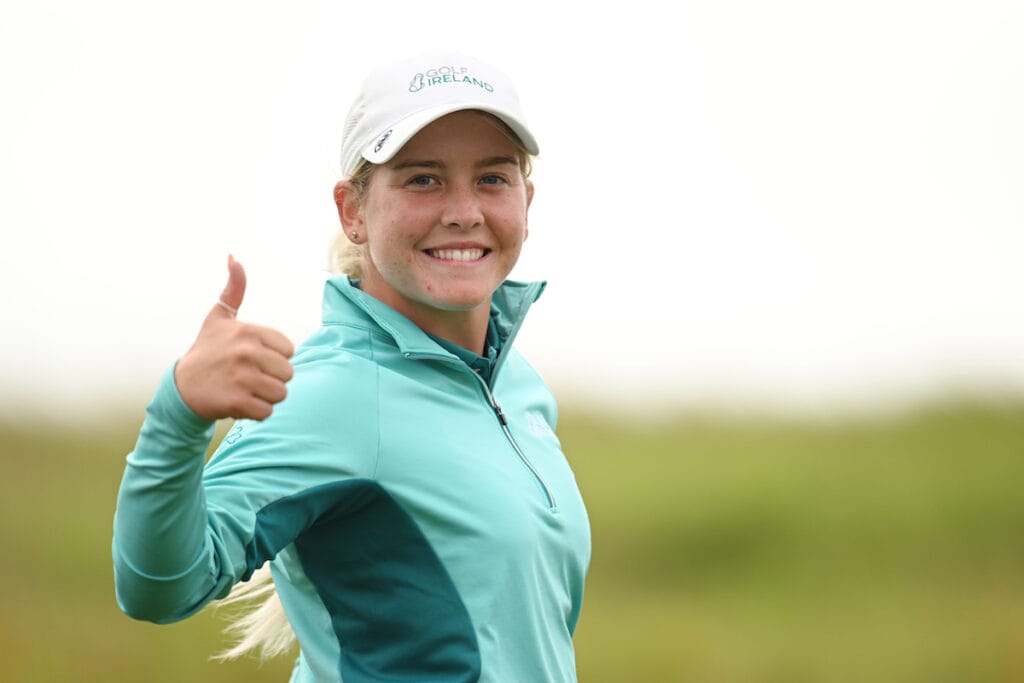
Looking at those results it’s safe to say that High Performance Director, Neil Manchip and his panel of coaches have done excellent work in creating pathways to harness the next generation of elite amateurs and are seeing them shine on the world amateur stage.
Add to this the fact that female participation in golf is increasing. Golf Ireland has received €479,500 in grants from Sport Ireland for women in sport since 2014 and their desire to encourage women to get involved in golf stems further than just playing. A key focus of the Golf Ireland Strategic plan includes increasing visibility and opportunities for female coaches. In 2022 Golf Ireland also launched the Women’s Coaching Network (WCN) with the support of the PGA of which there are 21 female coaches.
Disability golf is another area growing rapidly and Golf Ireland are leading the way in that regard having forged a new partnership with ISPS Handa to grow participation in Ireland for golfers with a disability and Brendan Lawlor is a fantastic role model as a touring disability golf professional.
So, there is certainly plenty to admire Golf Ireland for.
However, an area of concern that has emerged from players, ex-players and coaches in Irish golf is that there is a shortage of male professionals on the DP World Tour.
Since 2014, €16.8 million in grants have been given to Golf Ireland for a wide array of projects which included high performance & professional pathways, juniors, growing the game for women, golf club development and support & resilience funding. In this period, sixteen Walker Cup players have come through national panels, none of whom currently hold full DP World Tour status.
Jack Hume, a member of Ireland’s ‘Famous Five’ from 2015 has given up professional golf completely, while Paul Dunne, Cormac Sharvin, Gary Hurley and Gavin Moynihan are all currently in relative obscurity and Hurley is the only player with Challenge Tour status for 2024.
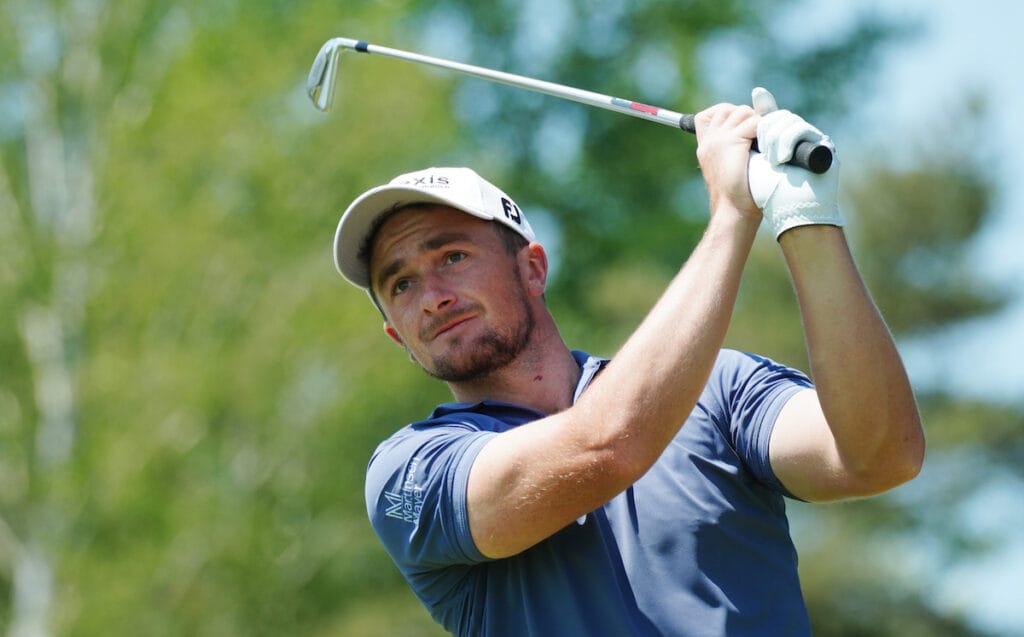
Ireland has had just sixteen players ever to feature inside the top-100 of the Official World Golf Rankings, but the numbers have now become worrying by their absence and a lack of depth has been exposed. The generation of players in their late-20s and mid-30s, who we would have expected to see on Tour, appear to have been lost.
There is a dearth of talent coming through in Irish men’s professional golf of course, but then we’ve seen that a lot in recent years. Scrolling through various mini tours like the Alps and Clutch Pro, names like Niall Kearney, Paul McBride, JR Galbraith, Conor O’Rourke and Ruaidhri McGee crop up, while James Sugrue and Moynihan have no status anywhere and John Murphy has a weak card on the Challenge Tour.
Last season, Ireland had six players at the Final Stage of DP World Tour Q-School; none were successful, and just one player, Conor Purcell, made the Grand Final on the Challenge Tour and only three finished inside the top-70 to maintain full status on Europe’s second tier.
If you think back to 1997, Pádraig Harrington was often one of ten Irishmen in a European Tour field, and for reference, there have been tournaments this year where Ireland has had no participants.
Even outside of the major championship winners, Ireland always had a solid representation in Europe with Paul McGinley and Michael Hoey winning multiple times in their careers, while Peter Lawrie and Damien McGrane carved out successful careers in Europe, winning a tournament each, as did Simon Thornton.
European leaderboards over the years have been populated with names like Des Smyth, Christy O’Connor Jnr, David Feherty, Philip Walton, Eamon Darcy, Ronan Rafferty and David Higgins through the 90s and 2000s.
Of the top-18 membership categories on the DP World Tour for 2024, Ireland have just five players listed. That puts us behind Denmark, Sweden, France, Scotland, Spain, Italy, and Germany. A stark indicator of Ireland’s dwindling presence in European professional golf.
So where does Golf Ireland come into this? Well, of the €16.8 million given to Golf Ireland in grants over the last decade, €2,365,000 has been allocated to the Golf Ireland Professional Scheme which was established in 1999 under the guidance of Padraig O’hUiginn to assist Irish professional golfers, both male and female, in the early stages of their careers.
Looking at the money spent to date, it is clear that Golf Ireland isn’t getting a return on this investment, but they feel it is unfair to label the current plight of professionals on tour as a lost generation.
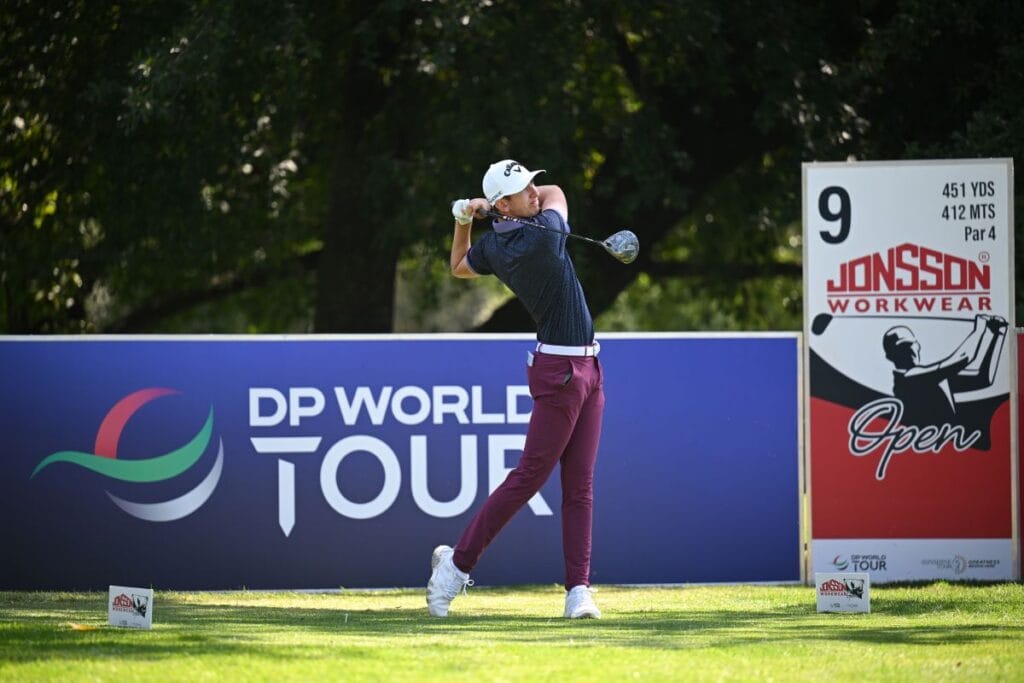
Neil Manchip believes that golf has become a more global game, squeezing spaces at the top level which increases the competitiveness when it comes to trying to earn tour cards.
“If you look at last year we had three new DP World Tour card holders,” Manchip detailed.
“Tom (McKibbin), John (Murphy) and Gary (Hurley). Tom has moved on and won for the first time, Gary had to take a medical extension and while John’s form wasn’t as good as he would have hoped, he is getting back up and running on the Challenge Tour. We have Conor Purcell, Ronan Mullarney and Dermot McElroy having personal bests last year.
“Paul Dunne and Jonathan Caldwell have won on tour so, there have been periods of success. It has to be acknowledged that it is very, very difficult on tour, it’s a tight filter with very few spaces.
“There’s more competition now at all levels and I think some years you will have lean years where not much happens, and other years, we will have a lot of winners and players. Over a long period of time you can make an assessment, but year to year there will be bumps, such is the competitive nature of the whole thing,” he added.
Lack of Support for Professionals
Last year, a record amount of €325,000 was provided by Sport Ireland to Golf Ireland for the management and administration of the Golf Ireland Professional Scheme, taking the total to just over €2 million since 2014, and while funding was increased, the number of players receiving the funding was reduced, with only seven players meeting the strict eligibility criteria. The players who played a full year on their various tours received €35,000 in funding through the scheme.
For players who do not meet the criteria to avail of the Golf Ireland Professional Scheme, they are not completely forgotten. Golf Ireland told Irish Golfer Magazine that players are able to use the facilities in Quinta Do Lago and avail of any Challenge Tour starts that they may be able to offer.
However, some players who have been part of the Golf Ireland Professional Scheme, coaches, and ex-professionals, feel that Ireland’s golf governing body have fallen behind in terms of support, coaching, innovation, education, and facilities, while countries with a lesser golfing tradition have moved ahead as they churn out conveyor belts of young talent.
Some professionals feel like there is no support structure in place and they are left alone and often they get lost.
At High Performance level, Golf Ireland are in regular contact with players on the Professional Scheme and hold regular committee meetings to see how they can change and improve, not just at professional level, but throughout their entire pathway strategy.
“We are talking to players and getting their feedback frequently. Through our Golf Ireland Professional Committee, we have a couple of meetings a year to go through things and we link in with Sport Ireland to keep us up to date. We are looking at all areas of our pathway,” said Manchip.
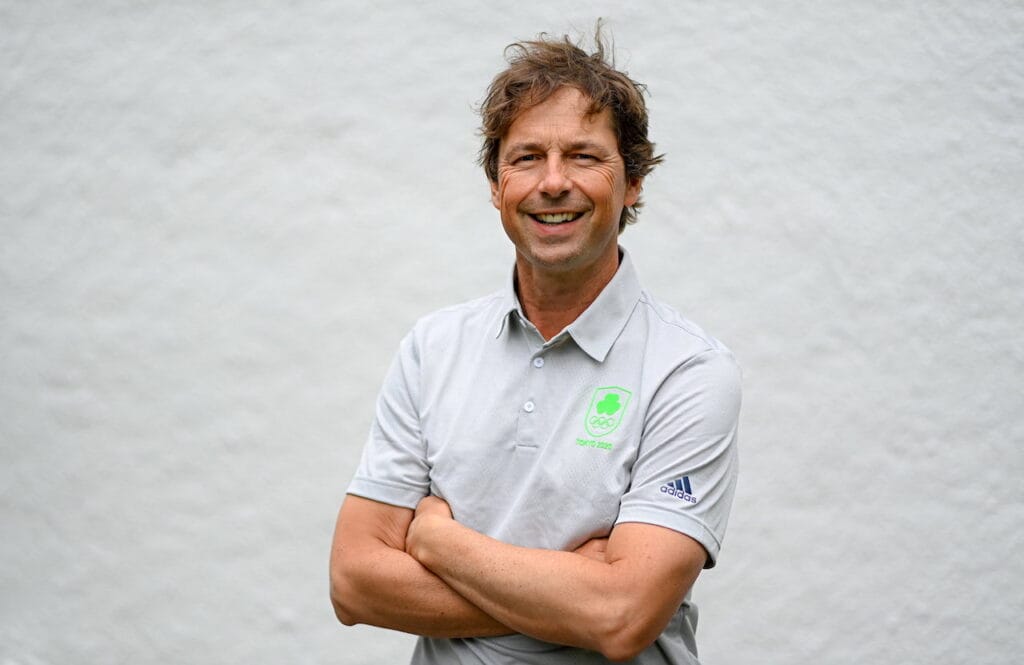
“We have current and former touring professionals that we work with, we have a former European Tour Professional on our HP committee, we work with nutritionists, S&C coaches, physios as well as swing and mental coaches. They all have a vital part to play in helping our players perform. We also have Major winners and former Ryder cup captains along with active touring pros helping our top amateurs and early-stage professionals,” he adds.
That said, one coach who asked not to be named travelled to the Final Stage of Q-School in Spain noticed that players from Spain, Denmark and France had ex-players in their camp, while the half dozen Irish contingent were left to their own devices. He stressed that Ireland could fall further behind these countries if we don’t follow a similar type of model.
“I was at Q-School and Raphael Jacquelin was there with the players and our guys were sitting at table on their own. I was thinking ‘how must they feel?’ in a very high-pressure situation not knowing the best way to act and having no Irish representative there was hard to see,” he told Irish Golfer Magazine.
“How can you compete with guys on tour if you aren’t able to act the same as them? You’re at a disadvantage straight away.
“The feeling that when a young guy is nervous before a final round, and they can go for a walk with someone like Thomas Bjorn to give them some advice on stuff he might have learned along the way. Even if we never did anything with facilities and everything stayed the same and we just brought in guys like Damien McGrane and Peter Lawrie and gave these players more starts things would improve because they are lost sometimes.”
Looking at more specific examples, ex-Ryder Cup player Peter Hanson caddied for Swedish sensation Ludvig Åberg in the Amateur Championship while Bjorn has been a fantastic mentor to the young Danish professionals coming through, most notably the Højgaard twins.
When asked about these additional supports that players receive, Claus Rojgaard Thomsen from the Danish Golf Federation detailed how freshly minted professionals in Denmark and the federation operate a ‘quid pro quo’ that works to the advantage of both the players themselves and the generations coming behind.
“We have Thomas Bjorn mentoring a lot of our younger professionals,” he said. “Another key factor is when players turn professional, they are invited to stay in our national team environment, work with our coaches, use our physios etc. In return our amateurs can practice with them and pick their brains from a young age which has helped a lot.”
Danish star Emily Kristine Pedersen echoed these comments about the structures in Danish golf which are producing top male and female players.
“We’ve had the Danish Golf Federation which is great at supporting us. Even after we turned pro, they have a pro-programme, so we keep being with the same coaches and they give us some money to help support our coaching and I think that has made a big difference to not be left completely alone once you turn professional. It’s nice to still have kind of a network and people to lean on.”
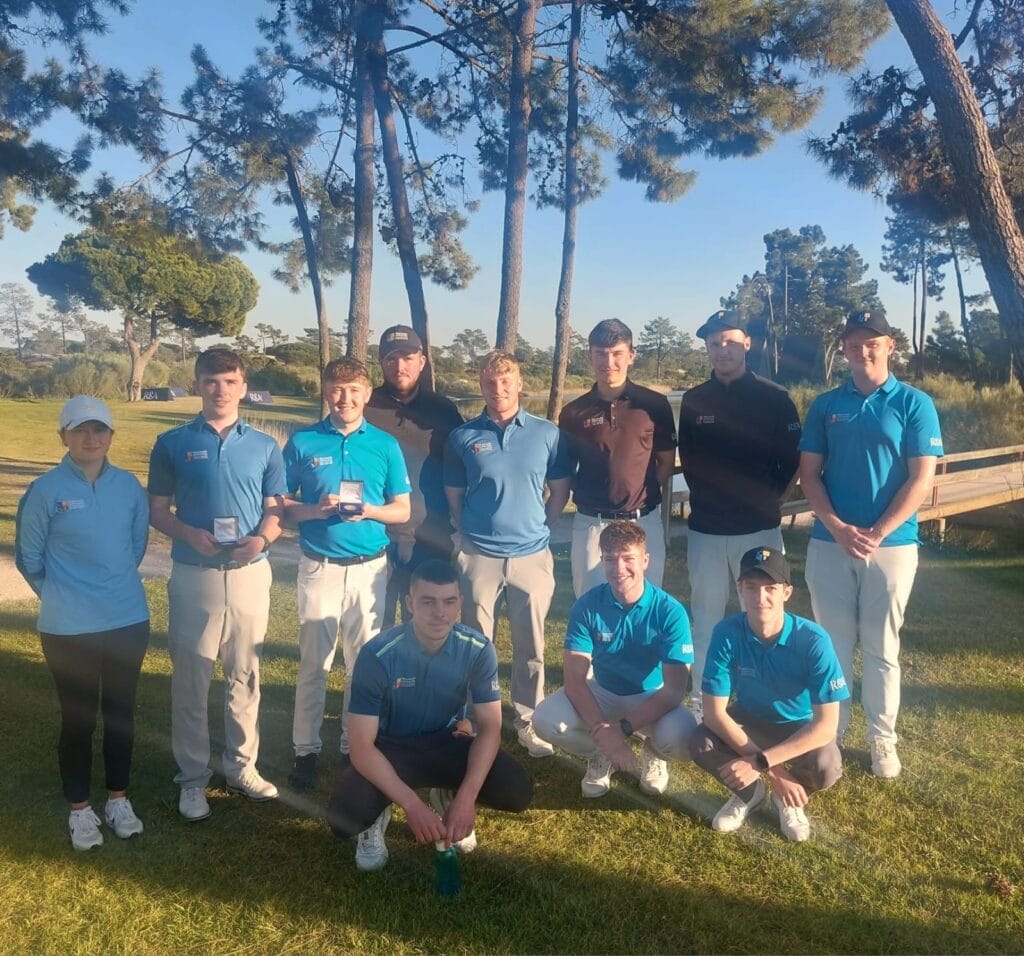
In Ireland, Maynooth University follows a similar model where Golf Manager, Barry Fennelly has developed an alumni support programme for the top amateurs coming out of the Paddy Harrington Scholarship programme who are looking to further their careers as professionals.
It is a two-year support system for the professionals and includes funding. Gary Hurley, Stuart Grehan, Robin Dawson, Ronan Mullarney and others have availed of this support and Maynooth University insists that their graduates can stay within the coaching system and travel with the student team to various warm weather camps for training as professionals.
“The guys can’t have enough support and it’s not just financial, it’s about making sure they have the right team around them. A holistic support system for these guys is huge,” said Fennelly.
“Even having an association with the national coaches in the set up should continue and be even more intense in the professional ranks. There should be mentorship to give the players the support they need.
“The guys who have been on tour for a few years have a lot to offer. I think it’s been missing over the last few years, and we really need to up our game in comparison to Denmark, Sweden, and France etc.
“Look at how many pros Ireland has had who can give back some knowledge to guys starting out and we should do a better job at it. Peter Lawrie, Damien McGrane have done so well and have so much to offer and we need to do it. You would learn how to make a living as a professional golfer.”
Responding to this, Manchip said in a meeting with Irish Golfer Magazine that the Golf Ireland High Performance programme incorporates pathways at amateur level and includes professionals, unlike other countries in the game.
“Our job is to develop pathways where we give opportunities at all levels. We are fortunate to have a fully integrated pathway where other countries do not just focus on the amateur game and let the professionals look after themselves. That’s not the case here.”
Calls for the presence of ex-players, coaches, mentors on tour for young professionals
Irish Golfer Magazine understands that several people have offered their services to Golf Ireland and Sport Ireland to help young professionals with life on tour.
“I never played Walker Cup, so I think you miss out on getting invites and getting them is a massive help on that. But once I turned professional, I had to go to EuroPro Tour Qualifying and do everything on my own, get my own status without any help really,” one player who missed out at Q-School said.
“Once I progressed, I started getting calls for invites on the Challenge Tour which was good because you earned it in a way but if I knew turning pro that I could have potentially seven invites plus nationals through Walker Cup I think that’s a much better way. We only have one Challenge Tour event in Ireland, and they have to pick and choose who to give them (invitations) to.”
Even on the Challenge Tour there are high-performance coaches from other countries accompanying players, and while Neil Manchip has attended events in the past, the bulk of his time is taken up as High Performance Director, and players would like to see Golf Ireland employ ex-professionals or coaches to step in and offer advice and support in this area.
“Having a coach or high-performance person coming to Challenge Tour events would be good. These aren’t criticisms of Golf Ireland but just things we could do better,” another player who is potentially one year from giving up professional golf explained.
“What I’ve noticed is the German players have a coach employed to go with them and he can do skills testing with them from Monday to Wednesday and they have a community atmosphere. Not everyone wants that but if you had the option, it’s huge for feedback and things.”
The appetite is there from players to avail of services and advice from the likes of Lawrie, McGrane and Thornton.
“Turning pro is lonely without question,” the player continued. “I had a great amateur career in terms of having a great time, we are looked after so well and when you turn pro it’s all on you. If we looked after ourselves a bit at amateur level it might help us. I wouldn’t mind picking Peter Lawrie’s brain because this will probably be my last year.
“Getting a past player in or a player with more experience to talk to for advice would be a great thing.”
Former DP World Tour professional and 2008 Spanish Open champion, Lawrie said he offered his services to Golf Ireland and Sport Ireland to help aspiring professionals, free of charge. It’s understood that there has been dialogue in this regard and Lawrie remains steadfast is his belief that there is a significant gap at the top when players turn professional.
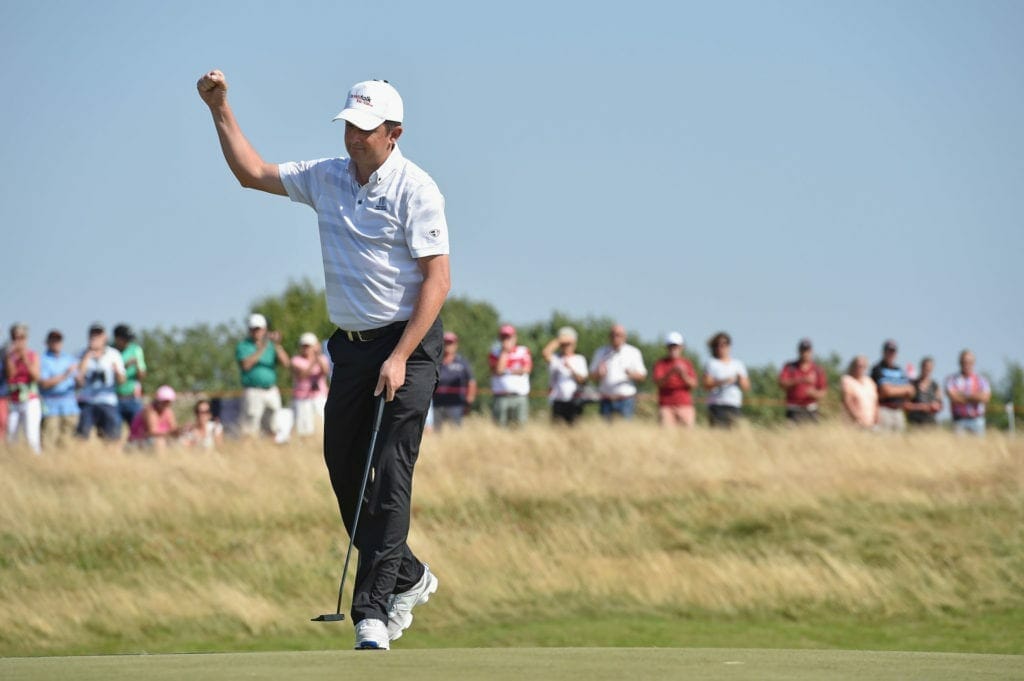
“Who runs the section for the professionals now? When I am a good amateur, I fall under Golf Ireland but when I turn pro like the lads in tour school, who looks after me then?” questioned Lawrie who carved out a successful career as a touring professional.
“We are not bridging the gap between amateur and professional because we are not employing anybody with experience.
“I wrote to Golf Ireland and Sport Ireland offering my services free of charge. I have been there and done it. It’s a frustrating thing because I know how hard it is out there, many others are thinking ‘what am I supposed to do now?’ Sitting in their hotel rooms, not knowing where the next tournament is going to come from. The grant the players receive doesn’t seem to be working like it should. They need more than money.”
Simon Thornton, who won on the European Tour in 2013, is another who would be delighted to offer his services to Golf Ireland as a mentor.
“I’d love nothing more than to help someone out,” he said. “I know a lot of other countries have other professionals in the background, ready to help the young lads coming through, and I would be delighted to help in any way I can with anybody.”
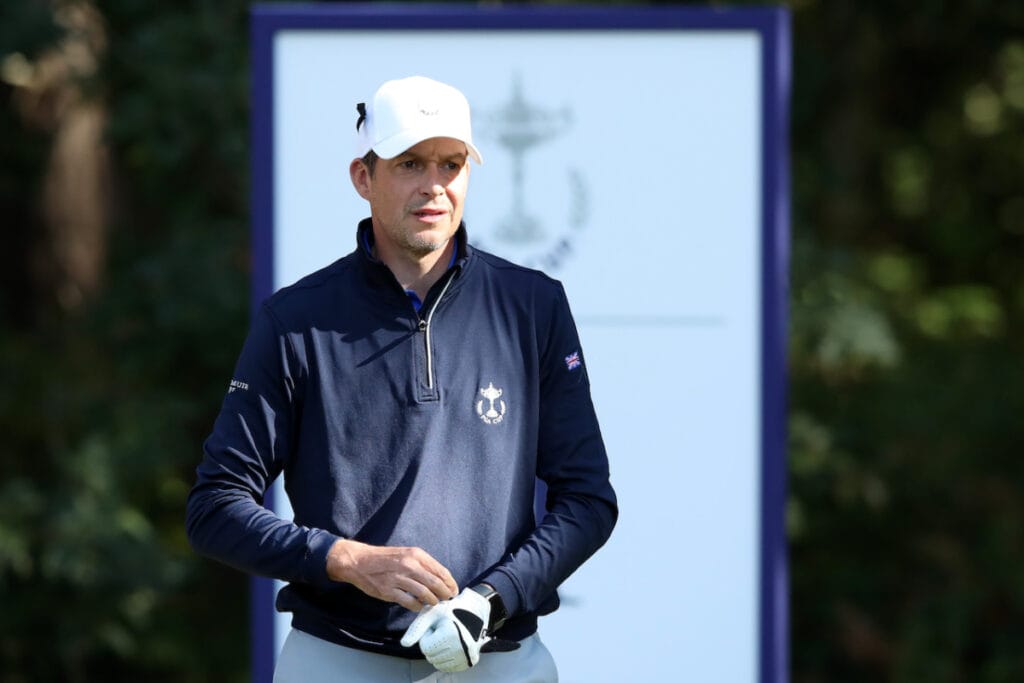
Thornton also detailed his experience of coming through the Golf Ireland Professional Scheme where he spoke of the lack of support structures outside of the funding.
“I was very well supported, and I couldn’t have done without the funding I received, but in terms of direction and a backboard, there wasn’t much. It was very much here’s your money and let’s see what you do, and we’ll see how much you get.
“You can’t put a figure on what Peter Lawrie is going to tell you and he will tell you a lot more than a cheque will tell you, so that’s the issue and they should spend the money in a different way.
“Nobody is the finished article in golf and when they turn pro they are still young and still learning so they might need some advice or support to bounce off.”
“Maybe the likes of myself would help even more because I’m not playing there now. There needs to be more of a team effort once these players turn pro. Is it Golf Ireland’s job to look after these guys to turn pro?”
Retired Golf Ireland representative golfer, Peter O’Keeffe, plied his trade on the Challenge Tour for six years before regaining his amateur status and the Douglas star feels Ireland are miles away from the benchmark now being set in professional golf due to the lack of support structures and transitional link between amateurs and professionals.
“There is no link, there is no safety net at all, you are just forgotten. You go from the inclusivity of Golf Ireland to nothing.
“I’m 42 and retired from Golf Ireland-representative golf – to be at my age and being around Harrington, Rory, Shane, McKibbin, to pick their brain would be huge. There needs to be more mixing to provide inspiration to other players, you can’t put a price on it. It will open someone’s eyes as well.
“We’re miles off unfortunately. You have Peter Hanson and Nicklas Fasth with the Swedes, Thomas Bjorn with the Danes, Gonzalo (Fernandez Castano) with the Spaniards, they are all doing it and it’s so available here. If I have anything to offer a Golf Ireland kid, I would 100% give them my time. The integration is missing here.
“Robin Dawson and Cormac Sharvin are prime examples, James Sugrue, John Murphy. We should all still be training together under a developmental group, and it should keep us all involved and the pros who do well in a tournament can come back and tell us about it. Then, when someone wins, the whole environment of the group changes. Tom McKibbin wins, and we can all learn from him. Then an amateur wins an event and the pros are supporting them. That would work really well, and it should filter all the way to Sean Keeling and Jack Murphy coming up.”
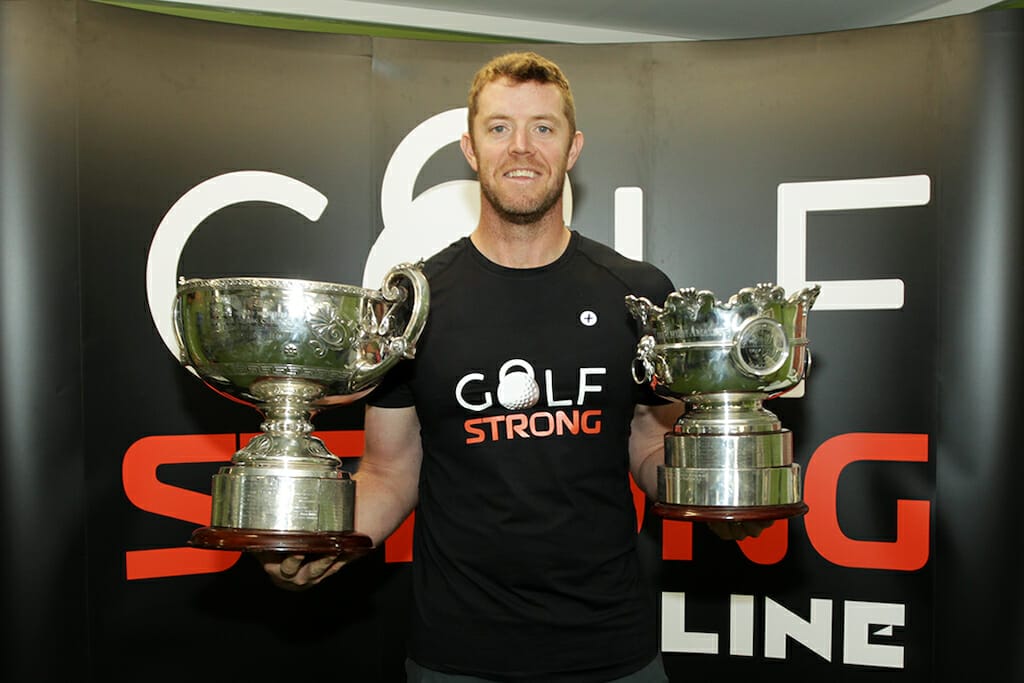
(Picture: Niall O’Shea)
In response Golf Ireland High Performance Director, Manchip, said Golf Ireland are on top of the issue of mentoring certainly from the amateur side, with several high-profile professionals giving feedback and advice in meetings.
“We try to help out with that. They have their own management companies who give them starts and support. We are part of that equation,” Manchip explained.
“What we try to do is give players experience at professional level at a younger age. We have players playing on the Challenge Tour, Irish Open etc where they get some experience. There is no doubt your first few years can be challenging, that’s part of the experience. Some players have fast starts, others slower. It’s about starting at the amateur side, and it is important that players are looked after in transition. We are fortunate to have Irish players who are willing to give in-person meetings and help out.
“We are keen to continue to develop the links between amateur and professional golf. In our pathway we have our area developmental section with 350 players, and we will have a call with their parents discussing how they get to the next stage. Same in our performance development side, we’ve had Tom McKibbin and Olivia Mehaffey on calls to share their experiences. Rory McIlroy has done a Zoom call, Paul McGinley several, Shane Lowry several, Padraig Harrington, Stephanie Meadow and Seamus Power.
“Most recently we had Lisa Maguire and Lauren Walsh speaking to our up-and-coming young amateur players. It’s great that our players are willing to give back and is a massive boost to hear from Major winners, experienced professionals and Ryder Cup captains.
“We are also keen on other perspectives and have had the likes of Stephen Gallacher, Pete Cowen and Sean Foley on to speak to our coaches, players and mentors.”
Calls for training camps and integration with National Panels
Current professionals have expressed their desire for Golf Ireland to provide training days throughout the season for elite amateurs and professionals on the Golf Ireland Professional Scheme so they can emulate the strategy implemented in Scandinavia and across Europe.
“The ability to integrate amateurs into professional life and into pro events – we are way down on that. We had two amateurs at the Challenge Tour event in Headfort this year, I think we could have six. The women are doing better with the KPMG Women’s Irish Open and the chances the amateurs get,” a coach who also expressed a desire for anonymity explained.
“We need innovation in facilities, coaching, educating the coaches that work for golf Ireland – we are lacking in that department compared to the French, Swedish and Danish. It is all about educating the guys who are teaching. The models are there because they are producing the players,” the coach continued.
Another player added: “I think that’s a good idea, especially when you have coaching days or weeks. I know Golf Ireland would go to Catalonia for a week, but if they could link the amateurs and professionals and get some sort of link and support system in place, that would be really good.”
“The pros and the amateurs playing with each other in the same system would be great, it doesn’t matter what schedule you are playing it would be a good idea.”
Concerns over Facilities
Last November it was announced that Spawell Golf Academy is set to be demolished after Dublin GAA signalled its intention to apply for a ten-year permission for the development of a new GAA Cluster Facility on site.
Spawell boasts a two-storey Toptracer Range facility, open seven days a week, with a fully stocked pro shop and a same-day club repair service.
The driving range proved to be immensely popular for people in the area but its convenient location just off the M50 at junction 11 made it easily accessible for road users passing by and it will be sorely missed when demolition eventually begins.
“I run the driving range there, yes, and it is successful, and I would have loved to have developed it further and [being] given the opportunity in a prime location, but unfortunately, Dublin GAA had much greater foresight than we do in the golfing circle,” explained Lawrie, who re-opened Spawell in 2019.
“It’s a pity Golf Ireland can’t do something similar and build practice facilities for young guys coming up. Golf Ireland and Sport Ireland can learn from an organisation willing to pump money into grassroots – where are the fees being pumped into Golf Ireland being shown?”
There is, of course, the Golf Ireland Academy at Carton House, not a million miles away from Spawell, so the point may be moot in this respect but perhaps there are opportunities for other facilities around the country? Leading from that, players and coaches alike have expressed some concerns about the Golf Ireland Academy in Carton House, and they feel that overall Ireland is lacking in top class practice facilities, both indoors and outdoors.
The lack of technology available at the Academy is another point mentioned by many and, when questioned, Golf Ireland did say that they were currently evaluating plans to develop the Academy further, with technology and indoor facilities two of the key areas.
“We are lacking in that department. It is all about educating the guys who are teaching. The models are there because they are producing the players,” a coach explained.
“If you go to Scandinavia they have the indoor golf facilities, all the colleges in America have the indoor stuff as well. Irish courses are quite wet in the winter, and some are closed, so an indoor facility would be quite good,” a player who missed out on a DP World Tour card at Q-School but wished to remain anonymous said.
“It’s been a huge let down over the last few years,” lamented another. “I’ve had this conversation with many people over what’s going on, and the facilities are one thing. They are not up to scratch compared to what we see in other countries. At the academy, we weren’t able to practice before 12. If you are a high-performance athlete, you should be able to use the facility whenever you want. There should be more use of technology, you should be able to use grass, proper golf balls, a trackman, maybe a quad.”
The practice facility for HP players is now available outside of public opening hours and players can access Callaway, Titleist and Srixon balls with Trackman launch monitors in place.
“We want to improve our facilities, it’s part of our strategic plan here at Carton,” outlined Manchip. “We are lucky to be in a great location which is pretty accessible for people all around the country. We are close to the airport with good hotel facilities.
“We need to improve our indoor offering. We have a great choice of grass bays, but sometimes winter conditions might leave them out of action. On any given day there should be access to perfect golf balls and grass tees. And players often bring their own technology, we have had a feasibility study done and as part of our strategic plan we want to upgrade our facilities.”
Lack of education about professional golf
Past players have also told Irish Golfer Magazine that they don’t believe there is enough education being given from Golf Ireland to aspiring professionals.
Consequently, there are concerns that it is too easy for an elite amateur in Ireland to turn professional without being good enough due to a lack of knowledge and statistical analysis.
“From what I have seen of golfers who should be coming through the system, I don’t think a lot of them realise and understand the effort that goes into getting there. I think a lot of them have seen social media and look at me, I’m doing this. Fifteen years ago, you didn’t know what anyone was doing,” explained Thornton who is now the Head Professional in Spa Golf Club.
“Neil Manchip has done brilliantly with the Irish team over the years but the next generation, take Tom McKibbin, he went against the grain, and he just went hell for leather for it and look what he has done already.”
Former Irish amateur champion, O’Keeffe, feels that there needs to be personal profiling in the Golf Ireland system because players looking to turn professional don’t know themselves well enough as they look to break away from the team environment in amateur golf.
He would like mentors to sit the elite amateur down and filter through their stats to see whether they are hitting the metrics required and if it is wise for them to enter the pro ranks.
O’Keeffe feels that it is too easy for golfers to turn pro and that the only players who should be told to turn pro from the Golf Ireland system are those who have dominated Irish golf over a significant period.
Overall, players, ex-players and coaches believe that the Golf Ireland Professional Scheme in its current form is outdated and not fit for purpose to develop a crop of successful male professionals.
Golf Ireland insists they conduct yearly reviews of the Professional Scheme, and they are confident that another crop of male professional players will come through on Tour.
Golf, like life, is rarely a straight line. There will be times when Ireland punches well above its weight, as we have in recent years, but the opposite is also true, and we will have times when we don’t.
Unfortunately, we’re in one of these periods just now and only time will tell how it all plays out, but it seems fairly obvious that we need to do something to bridge this gap at the top. And while Golf Ireland have a role to play in it, perhaps there are other avenues that should be investigated to ensure that Ireland is once again well represented on the international stage?

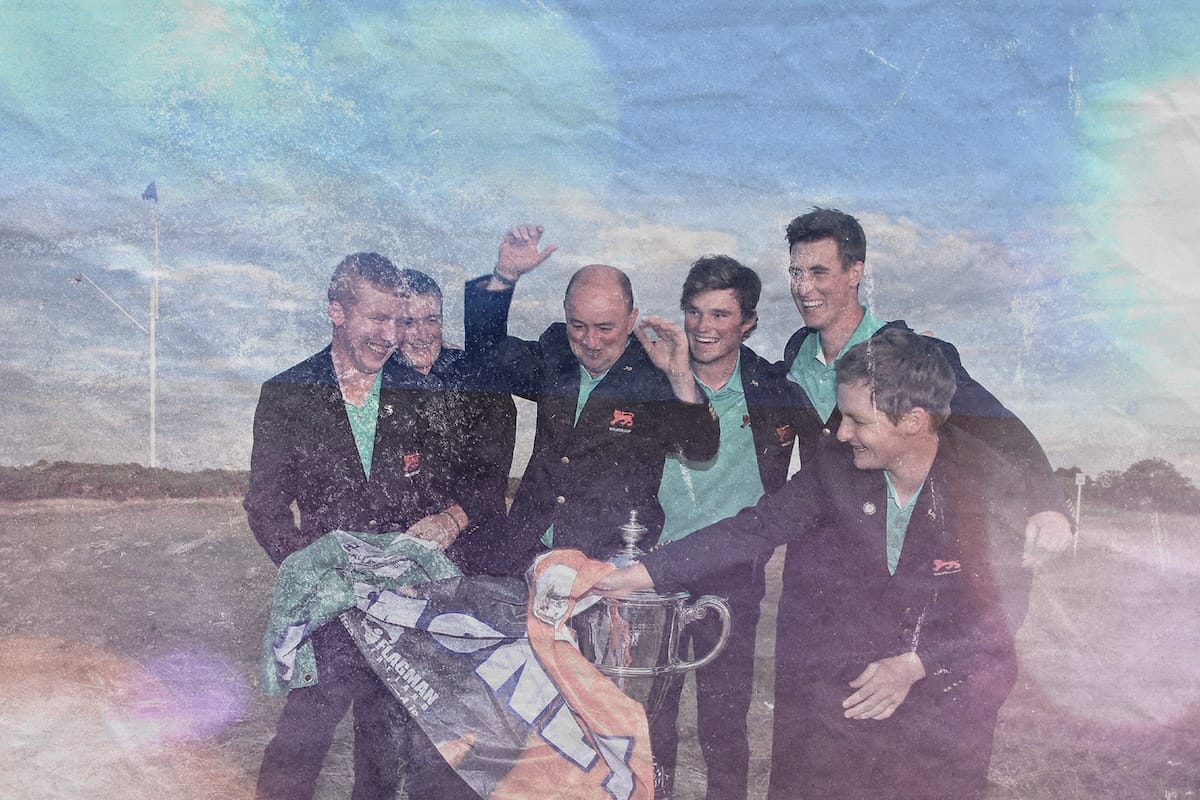










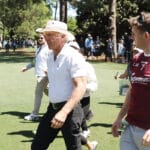





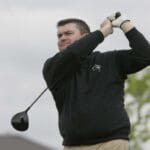




Leave a comment